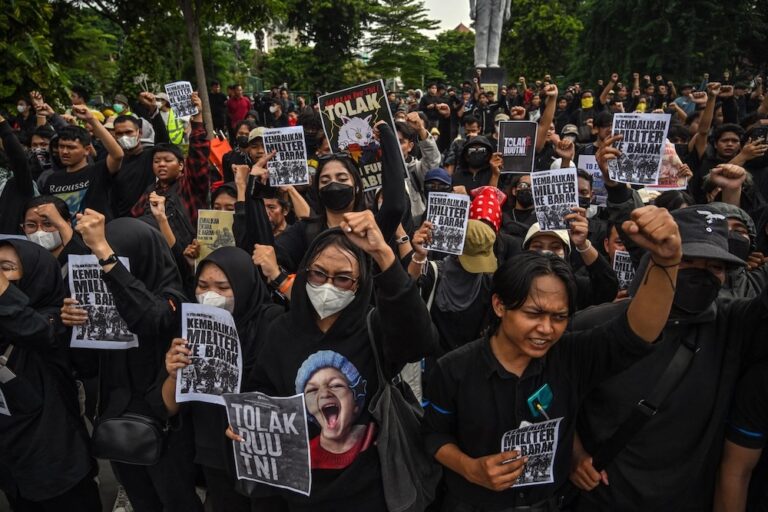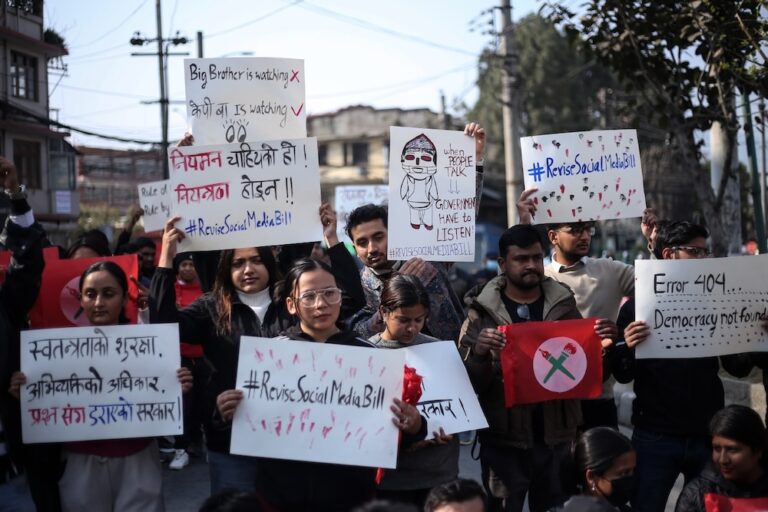April 2025 in Asia-Pacific: A free expression and civic space round-up produced by IFEX's regional editor Mong Palatino, based on IFEX member reports and news from the region.
Information blackouts during disasters, artists facing censorship, attacks against journalists during protests, promoting media safety, and spotlighting the work of exiled media.
Myanmar earthquake: Access to information and building resilience
A deadly earthquake in Myanmar exposed the brutality of the military government, which continued to launch airstrikes and impose censorship amid the humanitarian crisis. The Myanmar Internet Project pointed out the impact of the internet restrictions on disaster-hit communities: “The lack of internet access has severe implications for emergency services, hindering disaster response efforts, obstructing aid coordination, and leaving affected populations unable to reach out for help.”
ARTICLE 19 underscored the link between access to information and disaster response: “The Myanmar earthquake is a stark reminder of what happens when environmental disasters strike in the context of authoritarian rule. It exposes how freedom of expression, access to information, and unhindered connectivity are not luxuries — they are lifesaving necessities.”
If the actions of the Myanmar junta embodied the wrong approach in dealing with crisis situations, the Taiwan government’s civil defence drill under a “Whole-of-Society Defense Resilience Committee” might offer some lessons on how to engage stakeholders in upholding information integrity during a state of emergency. ARTICLE 19 shared a reminder on what it means to build a resilient democracy.
“Resilience is not just about bunkers. It is about ensuring that, even in the darkest hour, people can still communicate, stay informed, and engage in public discourse.”
“Art is dead when it offers no meaning”
In India, filmmakers resorted to self-censorship after authorities refused to release the movies “L2: Empuraan” and “Santosh” for depicting socially sensitive topics. The director of the internationally critically-acclaimed film “Santosh” noted that the cuts would undermine the film’s core message.
In Nepal, authorities said the film “Rajaganj” can only be released if scenes featuring a speech of the prime minister were removed. IFEX member Freedom Forum described this as “an absolute violation of free expression and artistic freedom.”
IFEX joined more than 40 organisations from around the world expressing solidarity with award-winning artist Badiucao, whose video art work was removed in Hong Kong and who was threatened with legal charges. The solidarity statement asserted that “Badiucao must be applauded for his efforts to creatively challenge censorship and authoritarianism in such a repressive regime.”
Badiucao explained that his video art work referenced the decline of civic space in Hong Kong after the passage and enforcement of the Beijing-imposed National Security Legislation.
“This art action underscores the absurdity of Hong Kong’s current civil liberties and legal environment. And it would remind everyone that art is dead when it offers no meaning.”
Journalists attacked during protests
In Nepal, a protest by royalist forces demanding the restoration of the monarchy turned violent and targeted journalists who were covering the activity. One journalist died after protesters burned a media house. Freedom Forum demanded accountability and legal action for those responsible for the violence.
Reporters Without Borders (RSF) said that at least 14 journalists and journalism students were attacked in Indonesia by security forces and unidentified individuals during nationwide protests against a new law that expanded the role of the military in the civilian bureaucracy. The attacks could be part of a systematic effort to silence critical voices after independent media outlets were previously targeted with serious threats.
Cédric Alviani, director of RSF’s Asia-Pacific Bureau, called on authorities to respect press freedom.
“Nothing justifies police brutality against journalists. We urge President Prabowo Subianto to take immediate steps to ensure that law enforcement respects the protection of journalists when they’re covering the news and that independent, transparent investigations are conducted to bring those responsible for these attacks to justice.”
Media safety and exiled media
In Pakistan, IFEX member Pakistan Press Foundation (PPF) has released guidelines to assist journalists filing complaints under the federal Protection of Journalists and Media Professionals Act and the provincial Sindh Protection of Journalists and Other Media Practitioners Act. PPF is encouraging journalists to maximise the resources available to ensure their safety and protection under the laws which were passed in 2021. The guidelines could boost calls for the establishment of a Commission for the Protection of Journalists and Media Professionals at the federal level.
Exiled Afghan journalists have launched a new online multimedia platform, Future Afghanistan, to provide independent reporting on the situation in Afghanistan. IFEX member the Afghanistan Journalists Center welcomed this initiative “amid escalating workplace restrictions and severe limitations on information access within the country.”
Global Voices featured the work of the Hong Kong journalist diaspora, which “continues to commit to their duty of amplifying suppressed voices” despite the government crackdown and the intimidation targeting their families. Media outlets such as The Chaser News, Green Bean Media, and Poton Media may be operating outside Hong Kong but they remain at risk, as incidents of transnational repression have worsened over the past year.



